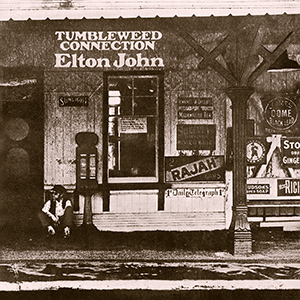“Ballad Of A Well-Known Gun” plays on that mythology right away, the simple combo supporting the pounding piano and Leon Russell-style vocal. But then “Come Down In Time” appears on the back of a plucked harp and reeds, a song of waiting and wondering amidst a wash of strings, and a wonderfully unresolved ending. It’s back to the theme for “Country Comfort”, its fiddle and steel guitar touches making it both akin and superior to Rod Stewart’s earlier cover. The Western theme continues on “Son Of Your Father”, a morality tale about a duel on a farm, the authenticity dashed by the first line’s reference to a “tramline”, but still in the established feel. The geography shifts slightly east to the Civil War South in “My Father’s Gun”, which is supremely elevated by its soulful chorus.
It’s not clear whether the narrator of “Where To Now, St. Peter?” is the father of the previous song, the son reaching the same end, or a doomed soldier in another war altogether. The ingredients are basic—piano, bass, drums, acoustic guitar, and a lead played both with a wah-wah pedal and through a Leslie speaker—but it’s that soaring vocal and subtle choir of well-paced high notes that carry it. In a similar placing and mood to side one, “Love Song” was not written by Elton or Bernie, but sung in a gentle duet with the song’s actual author, Lesley Duncan, with fingerpicking that recall John Lennon’s softer contributions to the White Album. Continuing the programming style, “Amoreena” puts us back in the lazy country, laughing fit to burst upon each other. The piano work is hardly lazy, those rolling chords more than just rhythm. “Talking Old Soldiers” is just voice and piano, sung in the form of a conversation, and reveals the album as not just a celebration of the Old West, but as a war protest. “Burn Down The Mission” is the closing epic, another dense Taupin lyrics that surpasses comprehension, but it’s the key and tempo changes Elton brought to the song that make it so good.
Tumbleweed Connection arrived only six months after the previous album, indicative of the speed of output that would follow. It’s also indicative of the quality of music we’d come to expect from Elton John, and why we care about him today. This train wouldn’t stop for long. (There were only two proper outtakes from the album: the sensitive “Into The Old Man’s Shoes”, which was used as a B-side, and “Madman Across The Water”, which wouldn’t have fit the theme of the album anyway and would be re-recorded for a future project. Both appeared on the expanded CD and eventual Deluxe Edition; the latter filled out its bonus disc with demos of some of the album’s tracks and a BBC session.)
Elton John Tumbleweed Connection (1970)—4
1995 CD reissue: same as 1970, plus 2 extra tracks
2008 Deluxe Edition: same as 1995, plus 11 extra tracks

I just played this in the car over the past two days. I was still moved by its excellence, even after almost 50 years. The only song that I never really cared for is "Taking Old Soldiers", because it's too much a dirge (although, I guess that's the point. I would have slotted in "Into The Old Man's Shoes" in its place). However, when I saw Elton on one of his duo shows with Ray Cooper in 1993, it brought the house down, so what do I know? Even people that might normally like Elton John could get into this one.
ReplyDelete